How Vitamin D Heals Your Gut and Improves IBS
Recent evidence is suggesting that vitamin D can help reduce inflammation in and heal your gut. This can lead to a healthier microbiota (the world of bacteria in your gut). Importantly, these changes lead to improvement of digestive symptoms as seen in IBS such as bloating, abdominal pain and altered bowels.
- This exploratory study suggests that vitamin D insufficiency is associated with alterations in microbiota composition that may promote inflammation and that supplementation with vitamin D has the potential to impact microbiota composition
Role of vitamin D on gut microbiota in cystic fibrosis
- Recent evidence shows that vitamin D acts to maintain the integrity of the gut mucosal barrier by enhancement of intercellular junctions that control mucosal permeability and reduction of pro-inflammatory molecules
- Due to effects on the intestinal mucosa, maintenance of sufficient vitamin D status may be essential for the development of a healthy gut microbiota, particularly in conditions defined by chronic mucosal inflammation
Gut microbiota interactions with the immunomodulatory role of vitamin D in normal individuals
- The role of vitamin D in the maintenance of immune homeostasis/ balance seems to occur in part by interacting with the gut microbiota.
Vitamin D appears to support healthy mechanisms in the gut, but can we tie this to positive outcomes? Does this help people feel better?
- Vitamin D improved IBS symptoms compared to placebo
- 50,000 IUs given every other week, which would equal 3,500 IU daily
- Here is a link to a previous episode where we go into more detail about this study
There are health benefits you may only be able to obtain from sun exposure, so make sure to practice safe sun exposure.
- There are specific guidelines on how to obtain safe sun exposure in my book Healthy Gut, Healthy You.
- We also discuss in these posts:
In summary, there is very exciting evidence that vitamin D can help to heal the gut.
Download this Episode (right click link and ‘Save As’)
Dr. Michael Ruscio, DC: Hi, this is Dr. Ruscio, and let’s discuss how vitamin D can help you heal your gut and, more importantly, how that healing of your gut can lead to healthier bacteria in your gut and, most importantly, how all these changes can lead to an improvement in your digestive symptoms and your symptoms of irritable bowel syndrome or IBS.
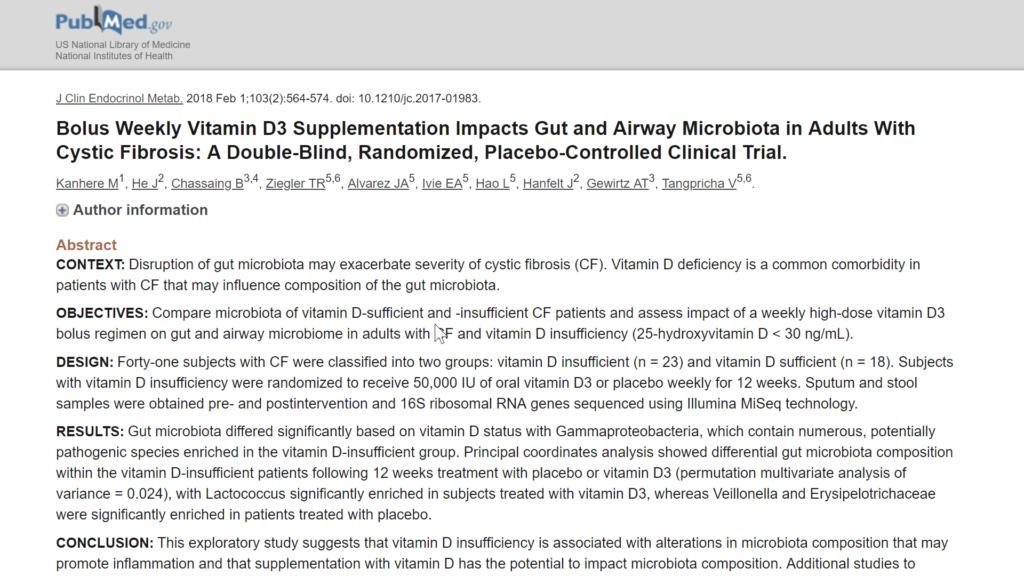
DrMR: So I’d like to start with this first study here. I’m going to through a few studies and tie together a few thoughts for you. So the first study, “Bolus Weekly Vitamin D3 Supplementation Impacts Gut and Airway Microbiota in Adults With Cystic Fibrosis: A Double-Blind, Randomized, Placebo-Controlled Clinical Trial.” Their conclusion, this exploratory study suggests that vitamin D insufficiency is associated with alterations in microbiota composition that may promote inflammation. And that supplementation with vitamin D has the potential to impact microbiota composition.
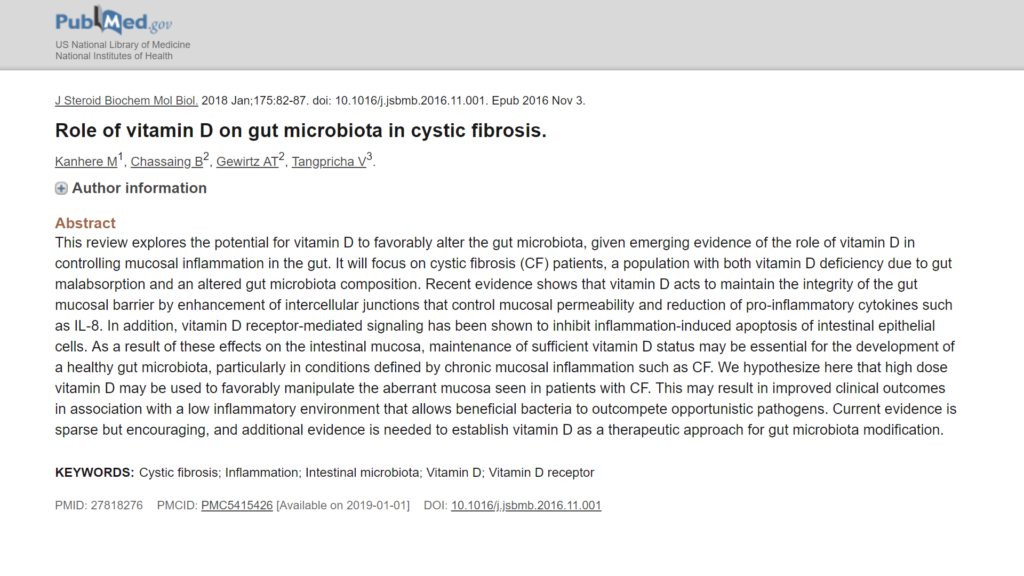
Now remember, if you have inflammation in the gut, that inflammation will create an environment that allows unhealthy bacteria to grow and is poisonous to healthy bacteria. So let’s continue along this theme and look at another similar study.
“The role of vitamin D on gut microbiota in cystic fibrosis.” There seems to be a fair amount of research, for whatever reason, on vitamin D, the microbiota, and in the condition of cystic fibrosis. But I will connect this to regular non-cystic fibrosis populations in just a moment. So to quote, recent evidence shows that vitamin D acts maintain the integrity of the gut mucosal barrier by enhancing intracellular junctions that control mucosal permeability, aka leaky gut, and reduction of pro-inflammatory cytokines or pro-inflammatory molecules. Due to effects on the intestinal mucosa or the mucous membrane in the gut, maintenance of sufficient vitamin D status may be essential for the development of a healthy gut microbiota, particularly in conditions to find a chronic mucosal inflammation.
So again, seeing this theme that vitamin D helps with essentially leaky gut, gut function, the gut barrier, and that leads to healthier gut bacteria.
Sponsored Resources
We’ve discussed previously that your mouth is the first section of your gut. So in order to have a healthy gut, you have to have a healthy mouth. That’s why I like Quip’s Electric Toothbrush, which is ADA approved. That’s the American Dental Association.
Quip provides an effective, two-minute cleaning with vibrations and guiding pulses that will alert you to when to switch sides. The timed guiding pulses combined with the soft bristles help prevent over-brushing, which can be a serious contributing factor to gum disease. And I can personally say that this has helped me.
What I like about Quip also is that their electric toothbrush starts at $25, which is much cheaper than most electric toothbrushes. If you go to GetQuip.com/RuscioPodcast, you’ll get your first refill pack free with a purchase of Quip’s Electric Toothbrush. That’s your first refill pack free at GetQuip.com/RuscioPodcast.
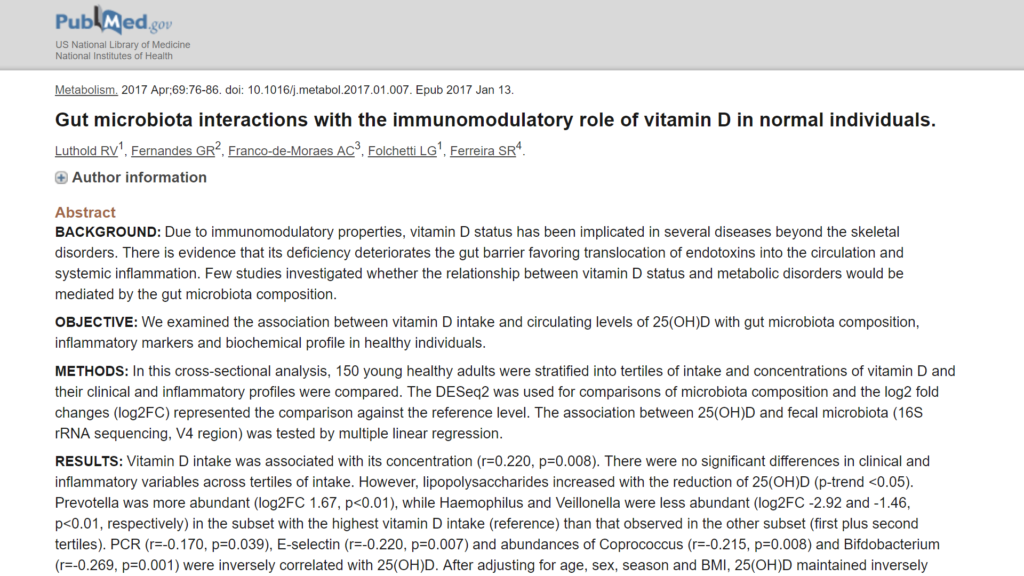
One more study, “Gut microbiota interactions with immunomodulatory role of vitamin D in normal individuals.” The role of vitamin D in the maintenance of immune homeostasis or balance seems to occur, in part, by interacting with the gut microbiota. And just a couple specifics from this study, lipopolysaccharides increase with reduction of vitamin D. Or the lower your vitamin D, the higher lipopolysaccharides are. And lipopolysaccharides are just one measure essentially of leaky gut.
Continuing, after adjusting for age, sex, season—the season of the year will affect vitamin D levels of course, sunny months, higher vitamin D—and BMI or body mass index, there was still maintained an inverse association between vitamin D and Bifidobacterium.
So after we adjust for people with different age, people with different sex, different times of the year, and body weight, all of which can affect vitamin D, we see that as vitamin D goes down, you have a decrease of Bifidobacterium. So there seems to be this positive impact of vitamin D on Bifidobacterium levels.
So, all this is very interesting. We see that vitamin D can help with inflammation, leaky gut, and the bacteria in the gut. But it’s very important to be able to tie these observations to an actual measurable, meaningful outcome in humans. Do these people feel any better? Because if all this stuff was happening underneath the hood and patients felt worse or the same, then it wouldn’t really be that meaningful. So it’s very important we tie these mechanistic changes to an actual measurable positive outcome in humans.
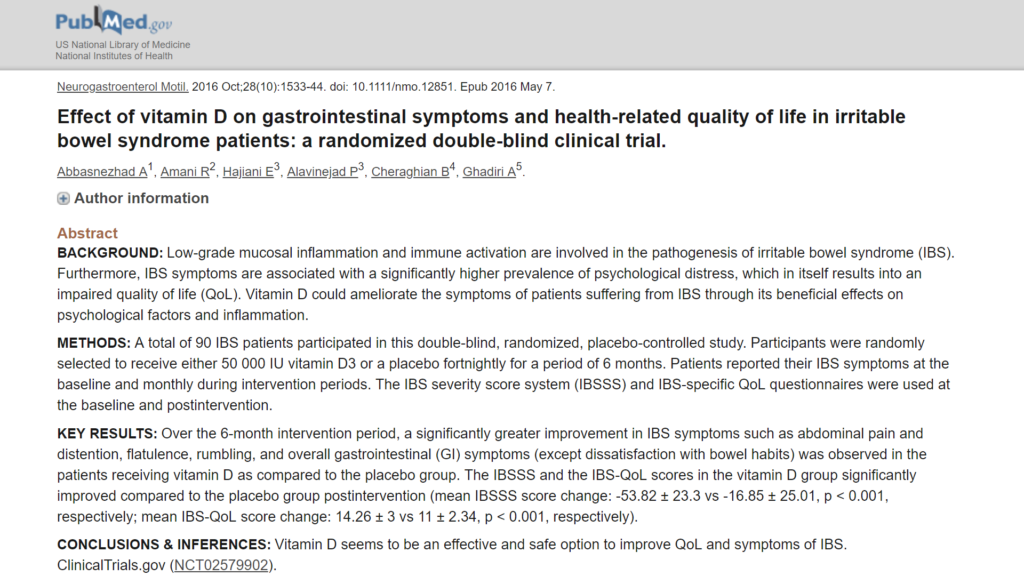
So continuing, “Effect of vitamin D on gastrointestinal symptoms and health-related quality of life in irritable bowel syndrome patients: a randomized, double-blind, clinical trial.” Summarizing, vitamin D improves IBS symptoms compared to placebo. Key, key finding. And in this study, 50,000 IUs were administered every other week, which if you broke that down to a per-day dosing would leave with you about 3500 units, which is pretty common daily dosing for vitamin D, usually between anywhere from 2000 IUs per day to 6000 IUs per day is what’s used. And I’ll also put a link in here to our previous episode where we reviewed this particular study in more detail.
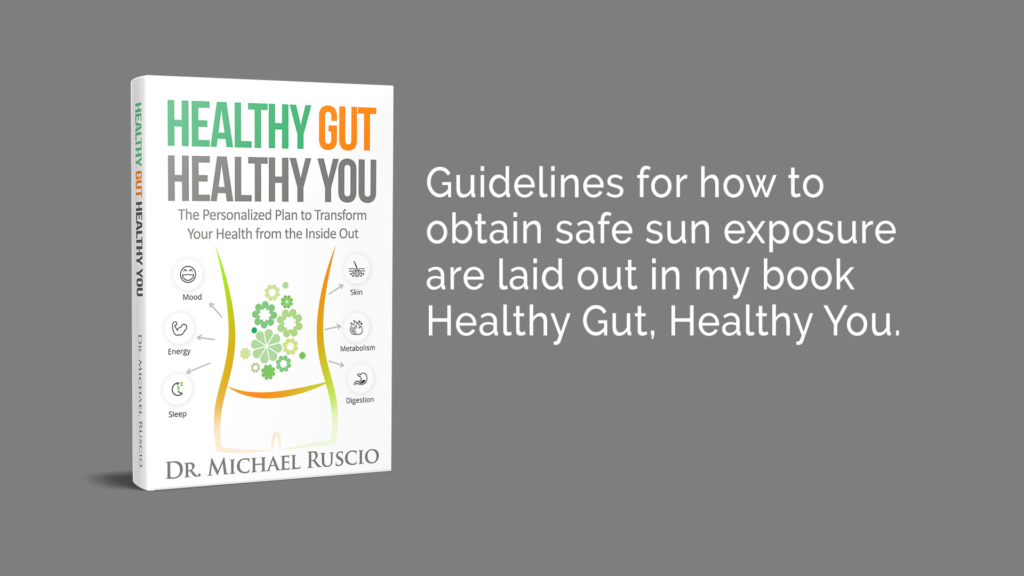
So, that’s very exciting. It’s also important to keep in mind that there are health benefits that you can only obtain from sun exposure and you cannot obtain solely by supplementing with vitamin D. So it’s important to practice safe sun exposure in addition to supplementing with vitamin D. And in my book, Healthy Gut, Healthy You, I lay out specific guidelines for how to use safe sun exposure to optimize your vitamin D levels.
So in summary, we show very exciting evidence that vitamin D can essentially heal the gut; that reduction of gut healing, reduction of leaky gut, and reduction of inflammation in the gut, leads to healthier bacteria in the gut; and then most importantly, all these changes summate to an improvement in people’s health, their well-being, and their digestive symptoms. So vitamin D, very important for one’s gut health, one factor of many to include in your gut healing regimen.
This is Dr. Ruscio and I hope this information helps you to get healthy and get back to your life.




Discussion
I care about answering your questions and sharing my knowledge with you. Leave a comment or connect with me on social media asking any health question you may have and I just might incorporate it into our next listener questions podcast episode just for you!